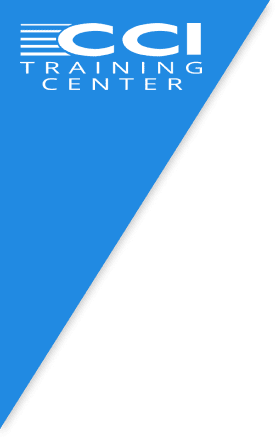Coursework for the Medical Billing and Coding Specialist Program

Coursework for the Medical Billing and Coding Specialist Program
CCI Training Center’s Medical Billing and Coding program is designed to prepare students for an entry level position in the healthcare industry in roles such as:
- Medical Records Technician
- Health Information Technician
- Medical Administrative Assistant
- Insurance Billing Coordinator/Specialist
These positions can be in a variety of healthcare settings and companies, such as:
- Doctor’s offices (including specialists)
- Hospitals
- Nursing homes
- Outpatient care centers
- Dentists’ offices
- Chiropractors’ offices
- Acupuncturists’ offices
- Ambulance services
- Companies providing healthcare services to medical establishments
Students learn how to organize and input health information data and learn to communicate with physicians and other healthcare professionals using electronic medical records.
Upon completion of the program, the student will receive a Certificate of Completion in Medical Billing & Coding Specialist.
Coursework in the Medical Billing and Coding Program
This program provides related training on subjects including electronic health records, records management, medical software, healthcare insurance, billing, medical law, ethics, HIPAA (Health Insurance Portability and Accountability), and medical terminology. Coursework includes:
Computer Fundamentals: An introduction to the use of the computer in business. Students will write letters, create forms, and format documents in Microsoft Word. This course will also include creating and formatting spreadsheets in Microsoft Excel. Included in the course will be printing documents, performing basic research on the internet, and effectively using the tools available in Microsoft Internet Explorer.
Allied Health Math: This course includes the fundamentals of math skills essential to the medical billing healthcare professional. The students will refresh, learn, and practice basic math skills including consumer mathematics, decimals, percentages, fractions, and the metric system.
Medical Law. Ethics, and Professionalism: Students are introduced to the legal relationships between physicians and patients, contractual agreements, professional liability, malpractice, medical practice acts, informed consent, and bioethical issues. Students learn legal terms, professional attitudes, and the principles and basic concepts of ethics and laws involved in providing medical services.
Medical Terminology: This course covers word building rules, prefixes, suffixes, and whole-body terminology. Students will learn terms covering anatomy and physiology, pathological conditions, and diagnostic treatments and procedures. Terms relating to each body system and medical specialty are included.
Anatomy & Physiology: Introduces students to basic anatomy and physiology. Emphasis is placed on the relationship between body structure and function and the procedures common to health care. Students should be able to identify body system components and functions relating this knowledge to the delivery of health care.
Basic Pharmacology: Introduces medical billing students to the study of medications and drugs. Students will learn the sources of drugs, their generic and brand names, the legal classification of drugs, routes and drug administration and describe drug interactions.
Medical Coding: In this course, the students will learn and practice the fundamentals of the CPT-4 and ICD-10-CM coding systems. The students will learn and practice Evaluation and Management coding, procedural coding from each section of the CPT-4 manual, in addition to diagnosis and procedural coding utilizing the ICD-10- CM volumes 1, 2, and 3.
Insurance Billing & Reimbursement: Introduces students to the field of insurance billing and reimbursement. Students learn the principles and practices of effective records management for electronic records systems. Students will learn alphabetic indexing, electronic file management, subject and numeric records management, and the relationship between electronic and image records.
Electronic Medical Records: Students learn and practice using a common medical records management software application in a simulated medical office. Students will learn and practice entering patient information, posting charges, payments, running financial reports and filing insurance claims.
Practicum: This course is a synthesis of the courses students completed throughout the duration of the Medical Billing & Coding Specialist program. The students will receive instructor-led theory with a hands-on lab project approach in this practicum. The student will complete assignments under the supervision of the instructor. The practicum includes career development topics such as resume writing, interview skills, job search, mock interview as well as job placement assistance.

